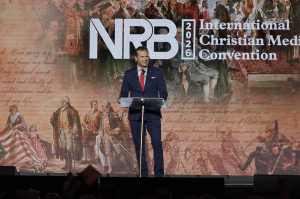Lessons From Piers Morgan's Interview With Joel Osteen
An interview that begins with a statement like, “Well, Piers, to me, faith is all about learning to be happy where you are,” is probably not going to end well. Piers Morgan’s interview with Joel and Victoria Osteen Tuesday night was very revealing about the Osteens - but little Christian truth was revealed. At the same time, the interview deserves closer attention than you might expect.
After introducing the Osteens, Morgan let Joel talk about his latest book, Every Day A Friday, How To Be Happier 7 Days a Week. Like the book itself, Joel’s presentation could be reduced to his own brand of highly therapeutic prosperity theology. For Joel Osteen, it’s not a theology that is reducible to money alone. Instead, his focus is more on individual happiness and self-fulfillment. In his rendering, God might not want everyone to be rich, but he does want his creatures to experience every day as . . . a Friday?
Then, the conversation shifted to issues in the news, such as abortion and capital punishment. On both topics, Piers Morgan pressed Joel to speak clearly, which he was clearly reluctant to do. On both topics, Osteen steered clear of disaster by saying as little as possible, in what can only be described as a garble.
On capital punishment: “You know, it’s a complicated issue, Piers. I haven’t thought a whole lot about it but, of course, you know, and I’m for second chances and mercy, yet, the flip side is there’s consequences for what we’ve done and, so, I - I don’t know what my total stance is . . . ”
On a moral link between abortion and capital punishment: “Well, I think there could be when you say may or may not. You know, that’s the troublesome thing, if we don’t know for sure and, you know.”
There, that clears it all up nicely. The saddest thing about Joel Osteen’s incoherence on all this is the fact that he seems to be totally unaware that Christians have been engaging these issues seriously for centuries. When even Piers Morgan chided Osteen for his fuzziness and lack of an answer to questions, saying to Osteen, “you need to be more definitive,” Osteen responded: “Yes. Well, if I could I would but I’d have to - let me study it and I’ll come back with a great answer someday for you.” Not exactly a “here I stand” moment, to say the very least.
But, with all that as prelude, the interview really got interesting when Morgan turned the conversation to the issue of same-sex marriage. Morgan replayed a clip from Osteen’s appearance earlier this year, when Osteen gave Morgan this statement on homosexuality: “Yes, I’ve always believed, Piers, the scriptures shows that it’s a sin, but, you know, I’m not one of those that are out there to bash homosexuals and tell them that they’re terrible people and all that.” That statement, as Morgan indicated, made headlines.
When pressed, Osteen affirmed his statement: “You know, Piers, it really never changes because mine was - mine’s based out of the scripture. That’s what I believe that the scripture says that - that homosexuality is a sin. So, it - you know, I believed it before and I still believe it now. Again, I would just reiterate what I said, I’m not after - I’m not mad at anybody. I don’t dislike anybody. But, you know, you know, respecting my faith and believing, you know, in - in what the scripture says, that’s the best way I can interpret it.”
But the host’s real intention was to steer Osteen toward the same-sex marriage issue. Would Osteen perform a same-sex marriage?
His answer: “Well, you know what, I’m going to respect the law and I’m going to respect gay people like I do now, you know, have plenty of people that come to our church and friends, I would call, that are gay so I’m going to respect that. I think where it puts a difficult situation is me being a Christian pastor believing the scripture, you know, it would be against my faith to marry two gay people.” Later, he added: “No, it would be against what I believe the scripture teaches and, so, that’s where I think the rub comes in with people like myself. It’s not that I’m against anybody or, you know, if people want to live together, that’s up to them. But, my faith, when we say marriage, I mean, I think about it, Piers, and all through the Bible there are, you know, hundreds of marriages but none of them are shown as between, you know, the same sex. And, again, I’m not against anything but I just believe that’s what the Bible teaches . . .”
Morgan would not let the topic drop, clearly sensing an opportunity to find a crack in Osteen’s position. The host then asked the Osteens if they would attend a same-sex marriage ceremony. Joel Osteen said that he would, if the individuals were friends.
Morgan pressed further. How does this fit within Osteen’s previous statement: “Well, I haven’t been to many weddings lately to begin with and I’m talking about somebody that was, you know, dear to us. I’m not going to disrespect somebody that’s dear to us and say, you know what, you’re not good enough for us or something like that. That’s the way that I would see it. Now, I’m not going to just run off and go attend, you know, certain marriages just to make a statement because that’s not who I am and that’s not what I stand for and, again, I don’t look down on those people.”
In other words, Joel Osteen sees homosexuality as a sin and same-sex marriage to be contrary to God’s will. He cannot perform same-sex marriage ceremonies or endorse same-sex marriage, because he is bound by Scripture. On the other hand, he can attend a same-sex ceremony, if the participants are friends, and thus endorse by his presence the credibility of the ceremony itself and join in the celebration of what he believes, or says he believes, is sin.
This is beyond mere incoherence. It is moral and theological nonsense. More than that, it is a massive statement of ministerial malpractice. Piers Morgan had the sense to see that much. You cannot celebrate what you say you know to be sin. You cannot honestly say that same-sex marriage defies the law of God, and then join in the celebration of that ceremony.
Joel Osteen should know better, but you can add that to the things that someone like Joel Osteen should know, if indeed he is to present himself as a Christian preacher and leader.
The larger problem is that many evangelical Christians would follow Joel Osteen’s logic without a second thought, or without even what the psychologists would describe as “cognitive dissonance.” They say they believe that homosexuality is a sin, and that same-sex marriage is contrary to God’s will. But they allow personal relationships and social pressure to override their (evidently) lightly-held convictions.
The hypothetical case Piers Morgan invented for his interview with Joel and Victoria Osteen is precisely the reality many American Christians will face - or have already faced - with the legalization of same-sex marriage. Unless convictions are deeply held, they will melt away in the face of cultural pressure.
Oh, one final and very significant statement from the interview demands attention. Piers Morgan looked at Joel Osteen and asked the million-dollar question:
But, I mean, shouldn’t the scripture be dragged kicking and screaming into the modern age. I mean, we were talking before the break about the issue about eye for an eye, tooth for a tooth, not everything in the scriptures, really, is, in my view, conducive to modern life. I mean, like everything else, doesn’t it have to move with the times and isn’t it down again to people like you to interpret it in a way that evolves when you’re known as a very progressive preacher?
Shouldn’t the Bible be “dragged kicking and screaming into the modern age”? There you have the modernist worldview reduced to a single question. The Bible will simply have to give way to modern moral authorities, and have to be interpreted “in a way that evolves.”
To his credit, Joel Osteen tried to stand his ground. To his discredit, he didn’t stand very well, and he seemed to lack all of the vital faculties for holding theological traction. We can only hope that other pastors - and other Christians - will do better. Sadly, without developing deeper biblical commitments and without drawing from the full wealth of Christian conviction, that is not going to happen.
Sadly, without a deep, humble, and faithful commitment to Christ, the Gospel, the Bible, and the structures of Christian thought, both the church and the Bible will be, to use Piers Morgan’s unforgettable phrase, “dragged kicking and screaming into the modern age” - and we know exactly what that means.



























